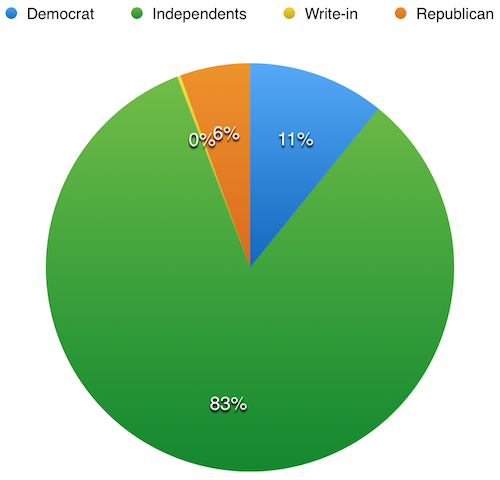Independents Trounce Partisan Nominees In 15th Ward Special Election
The unofficial results from Tuesday’s special election in the 15th ward are interesting to me. First, the turnout was a decent 17.5%. By contrast, the December 2011 special election in my ward, the 5th, just 10.37% of voters participated.
Here are some recent participation rates for the 15th ward:
- August 2014 primary: 23.95%
- March 2013 primary: 22.72%.
- November 2012 general: 73.71%
Huge difference between big national elections, state elections, and a special local race. Here are the unofficial results from Tuesday:
- MELISSA MCDANIEL (D) 123 [10.82%]
- JOSHUA SIMPSON (R) 63 [5.54%]
- MEGAN GREEN (I) 521 [45.82%]
- RHONDA SMYTHE (I) 427 [37.55%]
- Write-in Votes 3 [0.26%]
I made the following visual:

There was a time that being the democratic nominee meant easy victory, that may still hold true in many wards. Not in the 15th this year, Melissa McDaniel only managed to get 11% of the total. Ouch!
None of the four candidates received a plurality, but we don’t have runoffs or instant runoff voting. Megan Green will be sworn in as the next 15th ward alderman. In early 2015 she’ll have to defend the office, in March if she switches to the Democratic party, or April if she remains an independent. I still want to see all local offices become nonpartisan.
— Steve Patterson
If this had been a regular election, it would have been a Democrat who won in a two-way race.
Why? Because there would have been an open Democratic primary in which McDaniel, Green and Smythe ran.. with the winner advancing to the general election.
In a special election such as this, the Ward Committee picks the Democratic nominee forcing any other Democrats to run as Independents.
This is a non-story and not something which has nothing to do with any sort of trend or change in voting patterns.
Couple of assumptions on your part: 1) Green & Smythe would’ve ran as in a crowded partisan primary, 2) that the GOP would have fielded a candidate in a regular general election.
Remember, the Democrat usually wins in these special elections, see the 5th ward.
Both Green & Smythe sought the Democratic nomination — which leads me to believe if this was a regular election they would have sought the Democratic nomination in a primary.
The difference here is that the will of the people was not a factor in determining who the Democratic nominee would be, so they had to run as Independents in the general election.
And if it was a regular election where, as you said, two of either Smythe/Green/McDaniel were primary’d out, voter turnout probably would’ve been down 40 percent or more. 17.5% of registered voters is outstanding for a special aldermanic election — if it was just the winner of the primary and a lost-cause Republican (nothing against Josh Simpson, just that the R’s don’t do well historically at the municipal level)
An open election is a GOOD thing. More choices mean more turnout means more civic engagement. Primaries in a one-party town only result in viable and enthusiastic candidates (young or old) “wilting on the vine” as they wait their turn in the Party Committee system.
I agree with you 100% about the need for more nonpartisan local elections.
As a Tower Grove South resident who follows local politics but who has little in the way of inside connections, here is my take on what happened: Green and Smythe also sought the Democratic nomination (more specifically, the nomination of the 15th Ward Democrats), but it went to Pinkerton-McDaniel, who just so happens to be the Committeewoman for the 15th Ward Democrats. Green and Smythe then proceeded to run well-organized and energetic Independent campaigns and gained an array of endorsements from politicians around the city, while Pinkerton-McDaniel seemed to just rely on the nominal support of a few 15th Ward politicos (to the extent she had any kind of strategy at all). Perhaps she assumed that no one would run against her. Green and Smythe performed extremely well at two public debates, while Pinkerton-McDaniel seemed unprepared for the first one and declined to participate in the second one.
All of this might indicate the growing weakness of local Democratic operations—or it might be an exceptional case where an unprepared candidate ran into two talented opponents. I am not sure.